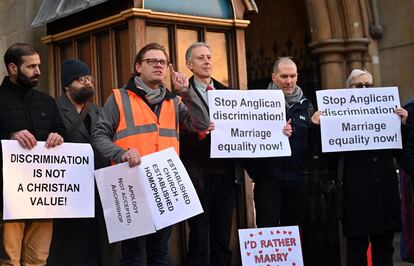Anglican Church weighs gender-neutral language for God
The Church of England’s General Synod will continue to block same-sex marriages in their churches, although it now allows clergy to recognize them


The Church of England has launched a commission to explore whether it will stop referring to God in the masculine. The General Synod of Anglican bishops is convening in London this week to debate doctrinal and liturgical matters. Regarding gender-neutral language, English speakers have it easier than others – just replace He/Him/His with the It/Its. But the change would be revolutionary and end centuries of faith in an omnipotent “Father.” How would we begin the Lord’s Prayer? Our Mother? Our Parent?
“This is nothing new. Christians have recognized since ancient times that God is neither male nor female, yet the variety of ways of addressing and describing God found in scripture has not always been reflected in our worship,” said a Church of England spokesperson.
The news broke during the Synod’s initial plenary sessions. Reverend Joanna Stobart, Vicar of the Diocese of Ilminster and Whitelackington, asked whether the Church had made progress on developing “more inclusive language” in services.
The answer came from the Right Reverend Michael Ipgrave, Bishop of Lichfield and vice-chair of one of the liturgical commissions responsible for gender and identity issues. “After some dialogue between the two commissions in this area, a new joint project on gendered language will begin this spring,” he said. “In common with other potential changes to authorized liturgical provision, changing the wording and number of authorized forms of absolution would require a full synodical process for approval.” The bishop’s words made it clear that there is still a long way to go before Anglicans can refer to the Most High as “It.”
Conservatives in the Church of England immediately protested. “The fact that God is called ‘Father’ can’t be substituted by ‘Mother’ without changing meaning, nor can it be gender-neutralized to ‘Parent’ without loss of meaning,” the Reverend Ian Paul told The Daily Telegraph. “Fathers and mothers are not interchangeable but relate to their offspring in different ways.”
Same-sex marriage
The debate over inclusive language and referring to God differently has stolen some of the limelight from one of the most burning issues facing the General Synod. After years of debate, Anglican bishops, clergy and laity agreed on February 9 to offer blessings to same-sex couples. However, this does not mean they can now get married in an Anglican church – doctrine and liturgy still prohibit this. The widely supported Synod decision (57% in favor versus 41% against) was a creative way of adapting to current social realities. Synod members also voted to “lament and repent” of the failure of the Church to welcome LGBTQI+ people and for the harm that LGBTQI+ people have experienced – and continue to experience – in churches.
The decision enables same-sex couples to come to church after a civil marriage or civil partnership to give thanks, dedicate their relationship to God and receive God’s blessing.
It is the culmination of six years of work and debate around identity, sexuality, personal relationships and marriage carried out by an official project of the Church of England called Living in Love and Faith.
Justin Welby, the Archbishop of Canterbury and de facto leader of the Anglican Church (King Charles III is the titular head), welcomed the decision on an issue that continues to generate controversy among Anglicans. “It has been a long road to get us to this point. For the first time, the Church of England will publicly, unreservedly and joyfully welcome same-sex couples in church. The Church continues to have deep differences on these questions, which go to the heart of our human identity. As Archbishops, we are committed to respecting the conscience of those for whom this goes too far and to ensure that they have all the reassurances they need in order to maintain the unity of the Church as this conversation continues.”
The process of incorporating the new doctrine has several phases before it becomes effective. The bishops have until July to develop a final draft of the language for blessing same-sex couples and debate how and under what conditions sex is permissible for gays. They must also decide whether gay Anglican priests can enter civil marriages. The resolution offers freedom to each parish to decide whether or not it will provide blessings to same-sex couples. However, several bishops want parishes that choose not to state this publicly to avoid painful or awkward situations for same-sex couples who want to participate in religious services.
Sign up for our weekly newsletter to get more English-language news coverage from EL PAÍS USA Edition
Tu suscripción se está usando en otro dispositivo
¿Quieres añadir otro usuario a tu suscripción?
Si continúas leyendo en este dispositivo, no se podrá leer en el otro.
FlechaTu suscripción se está usando en otro dispositivo y solo puedes acceder a EL PAÍS desde un dispositivo a la vez.
Si quieres compartir tu cuenta, cambia tu suscripción a la modalidad Premium, así podrás añadir otro usuario. Cada uno accederá con su propia cuenta de email, lo que os permitirá personalizar vuestra experiencia en EL PAÍS.
¿Tienes una suscripción de empresa? Accede aquí para contratar más cuentas.
En el caso de no saber quién está usando tu cuenta, te recomendamos cambiar tu contraseña aquí.
Si decides continuar compartiendo tu cuenta, este mensaje se mostrará en tu dispositivo y en el de la otra persona que está usando tu cuenta de forma indefinida, afectando a tu experiencia de lectura. Puedes consultar aquí los términos y condiciones de la suscripción digital.








































